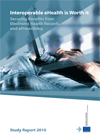
This publication is part of the study for the European Commission on the economic impact of interoperable electronic health records and ePrescription in Europe - EHR IMPACT.The views expressed in this report are those of the authors and do not necessarily reflect those of the European Commission.Neither the European Commission nor any person acting on behalf of the Commission is liable for any use that may be made of the information contained in this report.
Authors
Alexander Dobrev, Tom Jones,Veli Stroetmann, Karl Stroetmann, Yvonne Vatter and Kai Peng.
Download Interoperable eHealth is Worth it - Securing Benefits from Electronic Health Records and ePrescribing (.pdf, 10.031 KB).
Download from eHealthNews.eu Portal's mirror: Interoperable eHealth is Worth it - Securing Benefits from Electronic Health Records and ePrescribing (.pdf, 10.031 KB).